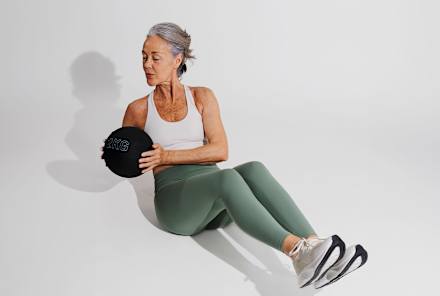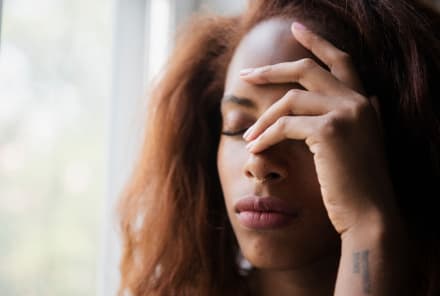Advertisement
The Wind Down With Integrative Optometrist Marina Gurvich, OD


Sleep was never really an issue for me when I was younger. I could go to sleep whenever, wake up whenever, and function well. There were even some nights that I wouldn't get any sleep (hello, college and grad school days) and still be able to manage.
I loved to sleep in, and once I fell asleep, I could sleep through the night without being woken up. This is generally still the case today, but now that I'm older, I definitely can't pull off getting as little sleep as I did back then.
Many health fundamentals such as diet, exercise, sleep, and mindfulness are all equally essential, and I strive to do my best in each category. But if there is one that affects me the most, it's definitely sleep.
For me, sleeping at the right times is just as important as sleeping enough. I'm a night owl and am most productive in the evenings and late at night. But I notice that if I don't get at least six to seven hours of sleep a night or if I fall asleep after midnight, I am not as sharp the next day.
My mood also changes: I'm more irritable, more anxious, and more negative. Exercise and nutrition don't seem to have the same effect on me. It's interesting to see how each one of us is unique—what works for some people does not for others.
Because I'm aware of how the quality and quantity of my sleep affects me, I prioritize sleep as much as possible. The tools I've found most helpful for sleep are magnesium glycinate, adrenal blend supplements, smoky wood essential oils in my diffuser, and mindbodygreen's dream mist on my pillow.
Of course, it helps when my room is dark, cool, and quiet too. I don't take baths every night, but I look forward to them when I do. I also find that keeping my evening routine simple makes me more likely to stick with it.

- Average hours I sleep a night: 8-9
- Ideal bedtime: 11-11:30 p.m.
- Ideal wake-up time: Around 8:30 a.m. on weekends; 7-7:30 a.m. on weekdays
- Nightstand essentials: Water with lemon, herbal tinctures (which vary every few months depending on what I'm optimizing), my diffuser, and mbg dream mist
- Favorite place I've ever slept: A resort in the Dominican Republic with open doors to let in the ocean sounds
- Sleep bad habit: Looking at my phone before bed (in night mode though). Working on changing this!
- Caffeine consumption: None. Caffeine makes me jittery, but I love herbal teas
- How I track my sleep: I don't use a sleep tracker
- The last product or habit that changed my sleep for the better: A relaxing bath! I've started taking baths with magnesium, a few drops of rosemary or eucalyptus essential oils, a crackling candle, and bath salts. It's even better with a jetted tub or jet mat—I just have to be careful not to fall asleep in there!
- The first thing I do when I wake up: Look at my phone (I know, working on it). It's usually just for a few seconds to check the time and look for any important messages I might have missed overnight. Then I close my eyes and think about a few things I am grateful for before getting up to take a shower and get ready for the day.

7:45 p.m.: It's a Sunday night—my favorite night of the week and the one when I have the best chance of actually completing my ideal wind-down routine. I start by taking a 15-minute walk.
8 p.m.: Drink a cup of herbal tea. Lately, it's been a mix of chamomile and EveryDay Detox Lemon.
8:30 p.m.: Take my nighttime magnesium and adrenal support supplements.
8:45 p.m.: Do laundry. Not my favorite choice, but I like to do the bedsheets and/or towels on the weekend to get a fresh start for the week. Spray the pillow with my dream mist.
9:15 p.m.: Bath time! I'll fill the bath with the relaxing products above, light a candle, turn down the lights, and soak. Sometimes I turn on soothing music, but usually, I'll just close my eyes and relax in silence, listening to the water and the crackling candle.
9:40 p.m.: Take a warm shower with soothing lavender soap.
9:50 p.m.: Brush my teeth and apply a rose water facial mist and face cream.
10 p.m.: Come downstairs to prep any items for my smoothie/breakfast in the morning. Since I'm a night owl, I like to do this prep work ahead of time.
10:10 p.m.: Grab the rest of my supplements: probiotic, COQ10, resveratrol, and quercetin to help my mitochondria. I also have a small snack of a few berries and a spoonful of almond butter to keep my blood sugar from dropping at night as I work on stabilizing it. Fill up my glass of water with lemon.
10:20 p.m.: Get in bed and wrap up a few last-minute tasks on my phone (texts, emails, online shopping...) and jot down a few notes to not forget. I try not to get stuck in this mode.
10:30 p.m.: Time to relax and do activities that feel good. I'll usually read a motivational book (Wellth, Daily Inspiration, and The Daily Stoic are a few of my go-to's). I like to clear my mind and think of something positive to end the day.
11 p.m.: Starting to get sleepy.
11:20 p.m.: Closing my eyes. Good night!
Watch Next
Enjoy some of our favorite clips from classes
Enjoy some of our favorite clips from classes
What Is Meditation?
Mindfulness/Spirituality | Light Watkins
Box Breathing
Mindfulness/Spirituality | Gwen Dittmar
What Breathwork Can Address
Mindfulness/Spirituality | Gwen Dittmar
The 8 Limbs of Yoga - What is Asana?
Yoga | Caley Alyssa
Two Standing Postures to Open Up Tight Hips
Yoga | Caley Alyssa
How Plants Can Optimize Athletic Performance
Nutrition | Rich Roll
What to Eat Before a Workout
Nutrition | Rich Roll
How Ayurveda Helps Us Navigate Modern Life
Nutrition | Sahara Rose
Messages About Love & Relationships
Love & Relationships | Esther Perel
Love Languages
Love & Relationships | Esther Perel
What Is Meditation?
Box Breathing
What Breathwork Can Address
The 8 Limbs of Yoga - What is Asana?
Two Standing Postures to Open Up Tight Hips
How Plants Can Optimize Athletic Performance
What to Eat Before a Workout
How Ayurveda Helps Us Navigate Modern Life
Messages About Love & Relationships
Love Languages
Advertisement

The 8 Best Tests To Diagnose A Hormonal Disorder (That Most Docs Don't Order)
Romie Mushtaq, M.D., ABIHM

How To Nurture Your Gut-Brain Axis For Stellar Mental Health, From A PhD
Christine Tara Peterson, PhD, AHP, RYT

Study Shows This Is The Most Effective Way To Build Strength If You're 65+
Molly Knudsen, M.S., RDN

The 8 Best Tests To Diagnose A Hormonal Disorder (That Most Docs Don't Order)
Romie Mushtaq, M.D., ABIHM

How To Nurture Your Gut-Brain Axis For Stellar Mental Health, From A PhD
Christine Tara Peterson, PhD, AHP, RYT

Study Shows This Is The Most Effective Way To Build Strength If You're 65+
Molly Knudsen, M.S., RDN

The 8 Best Tests To Diagnose A Hormonal Disorder (That Most Docs Don't Order)
Romie Mushtaq, M.D., ABIHM

How To Nurture Your Gut-Brain Axis For Stellar Mental Health, From A PhD
Christine Tara Peterson, PhD, AHP, RYT

Study Shows This Is The Most Effective Way To Build Strength If You're 65+
Molly Knudsen, M.S., RDN

The 8 Best Tests To Diagnose A Hormonal Disorder (That Most Docs Don't Order)
Romie Mushtaq, M.D., ABIHM

How To Nurture Your Gut-Brain Axis For Stellar Mental Health, From A PhD
Christine Tara Peterson, PhD, AHP, RYT

Study Shows This Is The Most Effective Way To Build Strength If You're 65+
Molly Knudsen, M.S., RDN













